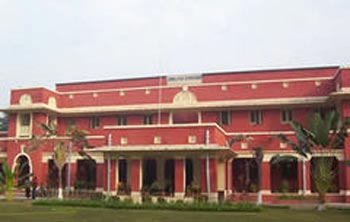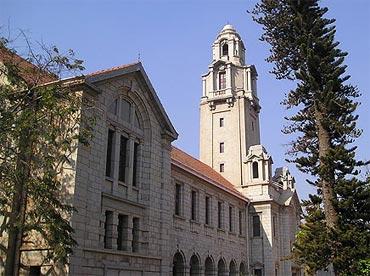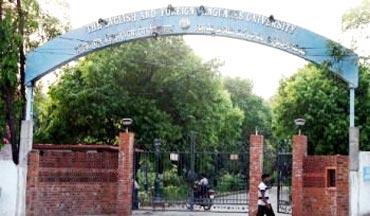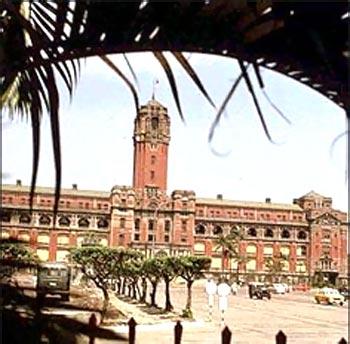Mahesh Sarma
Engineering and medicine remain the most preferred options for any aspiring youngster. Here are eleven relatively unknown gems...
For those who have passed 10+2, medicine still remain the most coveted programme, probably, because only around 32,000 seats are available for the more than 3.5 million students who are eligible to aspire for it.
And engineering used to come second, but with over one million seats available, the charm slowly is on the wane. In the last two years, our consistent aim has been to identify what other options one could seek out in addition to these. We have reviewed over 100 such courses and careers.
The IITs, AIIMS, RECs (NITs) are quite well known among the engineering aspirants. We are bringing out 10 unique ones here. They are an eclectic mix of institutions. Some are truly elite, some very democratic at entry level.
Some are very old. The Railway Institute (SCRA) began from 1927, while the space institute (IISER) is just about two years old. But what is common to both of them is that passing out from any one of them is a sure shot way to a fulfilling career.
DON'T MISS: 11 aspirational courses after 10+2!
SCRA (In Indian Railways)
Fast facts
Director: Prof.Pankaj Kumar
Approval/Accreditation: BITS Pilani
Flagship programme: Mechanical Engineering
Student intake: 14 Fees (full course): Nil and a stipend of Rs.9000 per month
Board & lodging (two years): Free
Admission test cut-offs: No data
Web site: www.irimee.indianrailways.gov.in/
In terms of exclusivity, it cannot get any better. Nearly over 1.5 lakh students vie for the 14 seats available. The Special Class Railway Apprentice exam (SCRA) sounds arcane, but there is nothing preparatory about this programme.
The selected candidates get trained for four years, not just in the field of mechanical and electrical engineering; they are also groomed to take up leadership positions in the Indian Railways as Class 1 officers. The only other route to enter the service is through the Civil Services Exam.
Housed at the Indian Institute of Electrical and Mechanical Engineering, Ranchi, this elite programme runs in two phases. The first two years are focused on theoretical subjects in engineering and management fields. And the students undergo their workshop and lab trainings at the BIT, Mesra campus. Supplementing the programme are the regular guest lectures and visiting faculties.
With over 18 core faculties on board teaching 10 students, it has an enviable student faculty ratio of 1:2, even putting together all the four years, the ratio still remains at an astounding 2:1. The students also could count on the 1450-strong alumni who are spread not only through out the railways system but also other sectors.
The amount of attention lavished on the students is quite high, and the well-rounded engineers are usually set for a fast track career. The icing on the cake is the fact that the trainees even get a stipend of Rs. 9000 per month during the course.
DON'T MISS: 11 aspirational courses after 10+2!
Indian Institute of Science (IISC) Direct PhD programme
Fast facts
Director: Prof. P. Balaram
Programme: Direct PhD
Approval/Accreditation: Deemed University
Student intake: 42 (but varies
Fees (full course): Rs. 13,300 per annum
Board & lodging (2 yrs.): Available
Fellowship: Rs. 10,000 per month going up to Rs. 18000 last year
Duration: 4 years
Admission test cut-offs: Only top rankers
Website: www.iisc.ernet.in
Other programmes: BS, M Mgmt, M.Tech
The Indian Institute of Science (IISc) was conceived as a 'Research Institute' or 'University of Research' by Jamsetji Nusserwanji Tata, in the twilight years of the 19th century. This one of the venerable institutions for higher studies in sciences and engineering, and has traditionally focused on offering research-oriented Master's and doctoral programmes in both the domains.
The programme enables motivated and talented Bachelor's degree-holders with a keen sense of scientific enquiry to pursue advanced research in frontier areas of Biological, Chemical, Physical and Mathematical Sciences leading to a PhD degree from the Institute. The institute claims that students entering this programme save nearly, on an average, one year compared to those who go for 2-year Master's degree programmes elsewhere and then join the Institute for PhD programme. In the cut-throat field of scientific research, an early start is always helpful.
Each year, the institute admits 42 students (12 in Biological Sciences, 12 in Chemical Sciences, 10 in Physical Sciences and 8 in Mathematical Sciences) under this programme. Entry into the direct PhD programme is a quite difficult. Candidates must have participated in International Olympiad in any of the science subjects or must have won the Kishore Vijanic Puraskar meant for child scientists or must sit for an entrance exam and clear the same.
The programme consists of a flexible course work, an internship-type laboratory training (wherein ample opportunities exist for the candidate to acquire basic experimental skills and familiarity with advanced techniques for research), research project to demonstrate attainment of a high degree of scientific ability followed by advanced research leading to PhD thesis on a specific topic. Direct PhD students also have the benefit of earning an intermediate Master's degree after they complete the required number of credits in theory and practical papers. It is one of the most rigorous scientific research programmes in the country and comes with the experience of studying under the best brains of the nation.
DON'T MISS: 11 aspirational courses after 10+2!
Indian Institute of Space Technology (IIST)
Fast facts
Director: Dr. K.S.Dasgupta
Flagship programme: B.Tech
Approval/Accreditation: Deemed University
Student intake: 156
Fees (full course): Assistantship by Dept. of Space
Board & lodging (2 yrs.): Available fully-funded
Admission test cut-offs: No info
Website: www.iist.ac.in
Other programmes: M.Tech, PhD
This is Asia's first Space Institute and the first in the world to offer a complete range of undergraduate, postgraduate, doctoral programmes with specific focus on space science, technology and applications. The institute has the unique mandate of encouraging and equipping brilliant youngsters from all parts of the country to take up an exciting career as Scientist/Engineer in the Indian Space Research Organisation.
For an aspiring 10+2 pass out the IIST offers three specialisations in its flagship B.Tech programmes. The B.Tech (Physical Science) programme primarily aims at training students in fundamental areas of physical science for application in space sciences and technology. The programme has been designed keeping such science requirements of space research in mind and has courses in Astronomy and Astrophysics, Remote Sensing, Earth System Science and Chemical Systems.
The B.Tech Avionics Programme is primarily aimed at training students in the area of Electrical, Electronics and Computer Systems. The Avionics curriculum includes a number of core Electronic and Electrical subjects like Control System, Digital Electronics, Communication, Computer systems and all other associated subjects. Targeted courses in Basic Sciences, Aerospace Systems, Economics, Management and Humanities help round off the education of the Avionics B.Tech graduate.
B.Tech in Aerospace Engineering is the third programme of the institute. Flight Mechanics, Theory of Machines, Aerospace Structures, Manufacturing Processes, and Automatic Control help shape up a graduate in this field. The students will get the specialised training in the design and development of launch vehicles, aircraft and spacecraft and hence deals with study of systems and components wherein optimum use and reliability are of paramount importance.
DON'T MISS: 11 aspirational courses after 10+2!
Jawaharlal Nehru University
Fast facts
Dean: Prof. R. N. Menon
Flagship programme: BA ( Foreign Language)
Approval/Accreditation: Central University
Student intake: 20 -25 in each course
Fees (full course): Rs. 648
Board & lodging: Available
Admission test cut-offs: Entrance exam
Website: www.jnu.ac.in
Other programmes: MA, MPhil, PhD
Ever since its inception in 1969, JNU has been at the forefront of offering courses in Humanities and Social Sciences. Though it offers only Master's programme in Social Sciences, its School of Language, Literature and Culture Studies, a major centre for teaching and research offers five-year integrated BA/ MA programmes in a host of Indian and foreign languages.
In major modern European languages - French, German, Russian, Spanish, Chinese, Japanese, Persian and Arabic - the school offers undergraduate, postgraduate and research programmes focussing on languages, literature, translation, interpretation and culture studies. The School also organises Certificate and Diploma programmes in some foreign languages such as Italian, Mongolian, Portuguese, Bhasa Indonesia, Pushtu and Urdu. It is the only School in the country that offers a BA programme in Korean language.
Besides foreign languages and literature, study and research in Indian languages and literatures, including English is also a major focus. Though at present these programmes exist only in English, Hindi and Urdu, the School hopes to add other Indian languages in a phased manner, perhaps beginning with Sanskrit, Bengali, Tamil and Marathi.
In addition, the sheer diversity of thought that permeates the campus, its unique political traditions, the open meetings in the mess and almost fully-residential status all add to its power to attract students from all over the country and abroad.
DON'T MISS: 11 aspirational courses after 10+2!
The efl university
Fast facts
Director: Prof. Abhai Maurya
Approval/Accreditation: NAAC
Flagship programme: BA
Student intake: Info not available
Fees (full course): Info not available
Board & lodging (two years): Nil
Admission test cut-offs: Yes
Other programme: MA, TESL, MA Linguistics, MA Arabic & French languages, PGDTE
Web site: www.efluniversity.ac.in/
The Central Institute of English was the brainchild of India's first Prime Minister, Pandit Jawaharlal Nehru. CIE, as it was called then, was set up in 1958 in Hyderabad to train English teachers. In April 1972, the CIE broadened its scope to include major foreign languages, and was renamed the Central Institute of English and Foreign Languages (CIEFL). For the last 50 years it has been a research and training institution in the field of languages.
In 2008, the Institute became 'The English and Foreign Languages University'. Undergraduate programmes (BA) were started to mark the occasion.
The institute offers BA programmes in English and Mass communication. Targeting a 10+2 pass out with a flair for communication, the English specialisation offers a wide choice in terms of grammar, prose and poetry.
Students can choose from a wide variety of optional courses in addition to doing core courses. This new course in Mass Communication and Journalism offers a student an opportunity to acquire comprehensive theoretical and practical knowledge required for a wide range of careers in the rapidly growing media field.
Each academic year comprises two semesters, and in each semester you will be registering for four courses. During the three years you will be taking 24 courses. The first four semesters will introduce you to the history, theory, production principles, and key debates that shape the field of media. In the final two semesters, you will choose an area of specialisation in which you will complete an internship with a media organisation and write a project report.
In addition to the courses in English literature, English Language, and English Language Teaching, you will also be learning a foreign language. You have a wide range to choose from: Arabic, French, German, Japanese, Russian and Spanish. You'll specialise in one of these languages for four semesters.
DON'T MISS: 11 aspirational courses after 10+2!
Indian Statistical Institute (ISI)
Fast facts
Location: Kolkata
Director: Bimal K Roy
Approval/Accreditation: Institute of national importance
Flagship programme: B.Stat (Hons)
Student intake: 20-25 per course
Stipend: Rs. 800 per month
Board & lodging: No info
Admission tests: INMO test/Institute entrance test
Other programme: B.Math. (Hons.), M.Stat., M.Math., M.S. in Quantitative Economics, M.S. in Library and Information Science, M.Tech. in Computer Science
Web site: www.isical.ac.in/
This college is about 60 years old, and yet admits not more than 20-25 students a year for the flagship BSc statistics programme. It is one of the few institutes where arrears are not fashionable. If you fail to achieve the minimum required 40% in aggregate a year you are asked to discontinue the programme. No wonder the entry is so restricted.
The Indian Statistical Institute (ISI) founded by Professor Prasanta Chandra Mahalanobis, grew out of the Statistical Laboratory set up by him in the Presidency College in Kolkata.The B.Stat.(Hons.) in Statistics was introduced in 1960 with the philosophy that the academic training of a statistician should be in relation to concrete problems arising from natural and social sciences. Such an interdisciplinary approach enables the graduates from the institutes to take up careers as Statisticians in research institutions and scientific laboratories, government departments or industries.
DON'T MISS: 11 aspirational courses after 10+2!
Indian Institutes of Science Education and Research (IISER)
Fast facts
Locations: Pune, Bhopal, Kolkata, Mohali and Thiruvananthapuram
Approval/Accreditation: Estd. by MHRD
Flagship programme: Integrated BS-MS
Student intake: 500 (100 intake in each IISER)
Fees (full course): Rs. 7850 per year
Board & lodging: Available
Admission tests: KVPY/ IITJEE/ Aptitude test
Other programme: PhD
Web site: www.iiserpune.ac.in/
The Government of India, through the Ministry of Human Resource Development (MHRD), has established five Indian Institutes of Science Education and Research (IISER).These institutes are located in Bhopal, Mohali, Pune, Kolkata and Thiruvananthapuram. The IISERs represents a unique initiative in India where teaching and education are totally integrated with state-of-the-art research, nurturing both curiosity and creativity in an intellectually vibrant atmosphere of research.
In addition to direct PhD and Master's programme, all the institutes also offer a 5-year BS-MS dual degree with major in Biology, Chemistry, Mathematics and Physics. IISER Kolkata offers major in Earth Sciences also.The uniqueness of the institution is that they offer a complete education in the basic sciences as well as advanced knowledge in a major subject area, supplemented by cutting-edge research experience.
Students will be continuously evaluated instead of the conventional single-exam evaluation.Though most institutes operate from temporary campuses, since they are well-funded they are endowed with research laboratories equipped with most modern facilities, high end computing facilities, multi-media labs and access to international learning grids plus sports and recreational facilities.
DON'T MISS: 11 aspirational courses after 10+2!
Chartered Accountancy (CA)
Fast facts
Location: All over India
President: G Ramaswamy
Approval/Accreditation: Recognized by an Act of parliament
Flagship programme: Chartered Accountancy
Admission test: Common Proficiency Test (CPT)
Other programme: NA
Web site: www.icai.org
They (CAs) are recognised as professionals with a robust knowledge of finance who have the ability to take decisions that can impact the future of the company. This is even more relevant in a dynamic global environment with an increasing need to manage risk, given the fact that many companies struggled with the recession last year.
The CA programme is intensive and clearing all three levels, needs persistence. Students can register after Class 10 but are eligible to give the Common Proficiency Test (CPT) only after they appear for their Class 12 exams. This is followed by Integrated Professional Certificate Course (IPCC) followed by the Final Course. Registration for CPT is open throughout the year and exams are conducted in June and December.
However, exams for IPCC and Final are conduced in May and November.The three-year article ship (on-the-job apprenticeship) after completing IPCC is what distinguishes a CA from an MBA or an accountant who might learn the subjects but may lack the hands-on experience and practical application of concepts for daily situations. The articleship period also helps the candidate to understand and appreciate the nuances of the trade.
Although the course fees are reasonable, the cost is much more for coaching classes in all subjects. The course is also reviewed periodically. In December 2008, the Accounting Technician Course was introduced to meet the huge demand for second tier accounting professionals for large, small and medium enterprises. Class 12 students can clear this exam and work for a year to be qualified as accounting technicians.
DON'T MISS: 11 aspirational courses after 10+2!
Company Secretary (CS)
Fast facts
Course: Company Secretary (CS)
Eligibility: Class 12/Graduation
Institute & Professional Council: Institute of Company Secretaries of India (ICSI)
Minimum duration: 2 years (after graduation), 3 years (after Class 12)
Exams: Conducted in June and December every year for all three levels
Fees: Rs 25,000 (including registration, examination and computer training)
Website: www.icsi.edu
The CS, the principal officer of the company, has a thorough understanding of management and law and acts as a point of communication between the board of directors and company shareholders, reporting in a timely and accurate manner on company procedure. He/she needs to ensure the compliance of the organisation in financial and legal practices, plus issues of corporate governance.
Guiding and advising the management on legal aspects of business areas like production, sales, marketing and administration is also a part of the job.
The postal course is exclusively offered by the ICSI, a statutory body recognised by the Government of India to regulate the profession. Students need to clear 3 levels of examinations Foundation (8 months), Executive (1 year) and Professional (1 year).
After clearing the Executive/Professional Programme, students must undergo 15 months of practical training in a company or under a practising Company Secretary during which they are paid a stipend ranging from Rs. 6000-10,000 per month. They are sponsored by the institute for the same.
There is also a 15-day practical training with Registrar of Companies, Stock Exchange, financial or banking institutions. that there should be additional impetus on the development of communication skills, since they are crucial for the job.
DON'T MISS: 11 aspirational courses after 10+2!
Delhi University (Select Colleges)
Fast facts
Approval/Accreditation: Delhi University
Flagship programme: BA (Hons) Programme
Student intake: Varies from College to college
Fees (full course): About 6,000 a year
Board & lodging (two years): Varies from college to college
Admission test cut-offs: 95% and above for in best of the four subjects in (10+2)
Other programme: BCom (Honours), BCom (Programme), BA (Hons.), BSc (Hons), BBA etc.
Web site: www.du.ac.in/
Some of them are embedded in the national consciousness. Every year lakhs of students try their hands at entering the portals of this University. An affiliating university, it is its colleges which are at times more popular that its own department. And entering these colleges is next to impossible, unless you are a near 100% scorer.
Take for example St. Stephen's College. Set up in 1881, it is the oldest extant college in Delhi. The college has an all-India and all-denomination membership; it has students and teachers from all communities and from all parts of India. There are also some teachers and students from abroad. Vibrant, intellectual with tremendous emphasis on all round development of the student, it is a dream college for many a student. Its biggest attraction is the old boy network that one can tap into, because of its long history of existence and service.
The same applies to the Shri Ram College of Commerce (SRCC). Set up 1920, the college is premium portal for commerce education in the country. The BCom( Hons) graduates from the institutes are some of the brightest candidates in the 10+2 regime, with cut offs ranging from 98 % to 95%. With such high calibre peer group, learning becomes very competitive, but students get placed immediately after the graduation itself at salaries comparable to that for an MBA from a lower rung Tier 1 B-School.
It is just not pedigree that is attractive. Take for example the College of Business Studies, set up recently in 1987, the college offers two much sought after programmes, BBS and BFIA. A first degree, the courses are so very well designed, students get recruited as a trainee analysts in leading financial and consulting firms at very high pay packages. No wonder, DU remains a dream destination for many a young student.
DON'T MISS: 11 aspirational courses after 10+2!
National Defence Academy (NDA)
Fast facts
Commandant: Lt Gen Jatinder Singh
Approval/Accreditation: JNU
Flagship programme: Training for career in Army, Navy & Air Force along with BA/BSc
Student intake: Info not available
Fees (full course): NA
Board & lodging (two years): Free
Admission test cut-offs: Not available
Web site: www.nda.nic.in.
With an alumni list that includes 8 Chiefs of Army Staff, 7 Chiefs of Naval Staff and 4 Chiefs of Air Staff; the National Defence Academy is the place to go for any youth aspiring to serve the nation through defence services. Situated in Pune, the 7000 acre + campus is a mini town in itself and boasts of world class training facilities, both for academic and co-curricular activities.
UPSC is the selection body for NDA. It conducts a written admissions test twice a year in June and December. Nearly one lakh students appear for the exam. Those who qualify the written test are called for selection which comprises extensive interviews covering general aptitude, psychological testing, and team skills as well as physical and social skills, along with medical tests.
About 300-350 cadets are selected out of the 100,000 applicants who appear for the written exam. Cadets who are accepted and successfully complete the programme are commissioned as officers in their respective Service. The pass-outs are commissioned at the level of 2nd Lieutenant or its equivalent and earns the privileges and perks of an officer and look forward to a fruitful career.
All the cadets joining the NDA after their 10+2 Examination are trained in the Academy for three years culminating in graduation in BA/BSc. or BSc. (Computer Science) degree of Jawaharlal Nehru University. For the first 30 years the institute only offered a general degree. It was only after 1994 when computing was introduced into all wings of the defence forces that a specialised programme in computing was devised and named degree was awarded.
Academic training forms an integral part of the NDA where academic excellence is a prerequisite for continued training. Academic instruction at the NDA is imparted by qualified and highly motivated civilian and service instructors. The curriculum is well rounded but demanding. It is supported by up-to-date libraries and laboratories. The aim is to achieve excellence in academic pursuits without compromising on outdoor activities.
Apart from academic training cadets gain proficiency in outdoor skills including horse riding. The emphasis in NDA is on character building, esprit-de-corps, mental and physical robustness, leadership and a sense of keen observation.













Comment
article